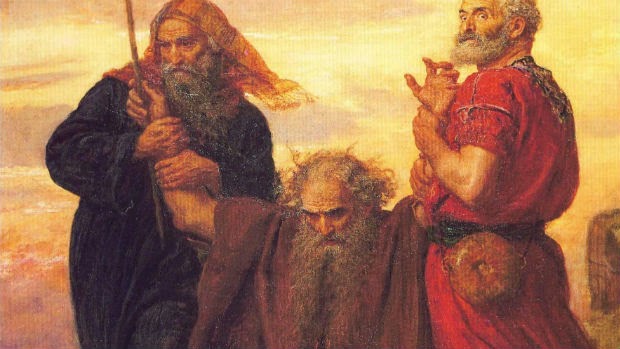Self-Reliance for Reliability and Self-Transcendence
Lincoln Cannon
23 November 2014 (updated 3 January 2026)

In the Hebrew Bible, we read of a fiery voice that burned as Moses wondered and questioned. “Why should I go to Pharaoh? Why should I bring the Israelites out of Egypt? Suppose I go and say, ‘God sent me?’ What if they don’t listen? What if they don’t believe?” Finally, Moses concluded, “God, please send someone else.”
Like Moses, when our minds expand with light and our hearts are filled with fire, when we’re pressed by our inspiration, you and I might have similar concerns and questions. Couldn’t someone else do the work better than me? Couldn’t God do the work better than all of us? Perhaps overwhelmed by the sheer audacity of our vision, we might conclude, echoing Moses, “God, please send someone else.”
But for Moses, the fiery voice only burned brighter. Many times, after going to Pharaoh and bringing the Israelites out of Egypt, Moses would hear it again. And so would his brother, Aaron. But when the voice illuminated others who prophesied in their camp, Aaron wondered and demanded, “Moses, stop them!”
Like Aaron, when we see others’ eyes brightening and sense their pulses quickening, when we’re surprised by their aspiration, you and I might have similar reservations. Shouldn’t someone else do the work rather than her? Shouldn’t God do the work rather than any of us? Perhaps worried by lack of precedent or indignant for the status quo, we might demand, with Aaron, “Moses, stop them!”
But Moses would only encourage them, as the fiery voice had encouraged him before. “Are you jealous for my sake?” Moses replied, “I wish all the people were prophets and that God would put the Spirit on them!”
Imagine. What if the Apostle Paul had believed that only Jesus could fulfill the prophecy that all the world would hear the Gospel? What if Brigham Young had believed that only Joseph Smith could fulfill the prophecy that Zion would be established on Earth? What if the Book of Mormon were a story about God instantly teleporting people to their promised land, rather than asking them to forge plates, carve bows, follow compasses, build ships, plant fields, and construct temples? What if we believed that, because of the goodness of God, we could do nothing and God would still save us.
In contrast, the Apostle Paul didn’t wait for Jesus to do all the work. No. He preached the Gospel from one end of the Roman empire to the other with unparalleled success, and that’s not all. Paul also deeply embraced and championed Jesus’ invitation for all to become one in Christ, internalizing in each of us the work of consolation, healing, and raising each other up together. Here are Paul’s words:
“Now I rejoice in what I am suffering for you, and I fill up in my flesh what is still lacking in regard to Christ’s afflictions, for the sake of his body, which is the church. I have become its servant by the commission God gave me to present to you the word of God in its fullness – the mystery that has been kept hidden for ages and generations, but is now disclosed to the Lord’s people. To them God has chosen to make known among the Gentiles the glorious riches of this mystery, which is Christ in you, the hope of glory. He is the one we proclaim, admonishing and teaching everyone with all wisdom, so that we may present everyone fully mature in Christ. To this end I strenuously contend with all the energy Christ so powerfully works in me.”
Likewise, Brigham Young didn’t give up the work when a mob killed Joseph Smith. To the contrary, he gathered the people and led them across the plains and mountains of the American West, where he established flourishing colonies that we enjoy to this day, and that’s not all. Brigham also recognized and encouraged the radical practicality of Joseph’s vision, which depended not on fortune-telling, but rather on a prophecy of interactive forth-telling, that would provoke us to take on responsibility for building heaven together. Here are Brigham’s words:
“You may now be inclined to say, ‘O, this is too simple and childlike, we wish to hear the mysteries of the kingdoms of the Gods who have existed from eternity and of all the kingdoms in which they will dwell; we desire to have these things portrayed to our understandings.’ Allow me to inform you that you are in the midst of it all now, that you are in just as good a kingdom as you will ever attain to, from now to all eternity, unless you make it yourselves by the grace of God, by the will of God, by the eternal Priesthood of God, which is a code of laws perfectly calculated to govern and control eternal matter. If you and I do not by this means make that better kingdom which we anticipate, we shall never enjoy it. We can only enjoy the kingdom we have labored to make.”
The Book of Mormon epitomizes this encouragement to self-reliance. One of the best examples comes from Captain Moroni. When he perceives his people to be waiting passively for God to save them from destruction, he writes:
“Can you think to sit upon your thrones in a state of thoughtless stupor, while your enemies are spreading the work of death around you? Yea, while they are murdering thousands of your brethren – … Behold, could ye suppose that ye could sit upon your thrones, and because of the exceeding goodness of God ye could do nothing and he would deliver you? Behold, if ye have supposed this ye have supposed in vain. … Or do ye suppose that the Lord will still deliver us, while we sit upon our thrones and do not make use of the means which the Lord has provided for us? … Do ye suppose that God will look upon you as guiltless while ye sit still and behold these things? Behold I say unto you, Nay.”
The Book of Mormon also contextualizes self-reliance in important ways, acknowledging both limiting dependencies and reinforcing applications. Maybe the best example comes from King Benjamin. After building a tower from which to speak, so his voice will carry as far as possible, he proclaims:
“I say unto you, my brethren, … that if ye should serve him who has created you from the beginning, and is preserving you from day to day, by lending you breath, that ye may live and move and do according to your own will, and even supporting you from one moment to another – I say, if ye should serve him with all your whole souls yet ye would be unprofitable servants. … And now I ask, can ye say aught of yourselves? I answer you, Nay. Ye cannot say that ye are even as much as the dust of the earth; yet ye were created of the dust of the earth; but behold, it belongeth to him who created you. And I, even I, whom ye call your king, am no better than ye yourselves are; for I am also of the dust. And ye behold that I am old, and am about to yield up this mortal frame to its mother earth.”
Yet consistent with awareness of this pervasive grace is the opportunity and motivation to apply ourselves for each other, perhaps to help each other become together far more than we could possibly become alone. King Benjamin continues:
“I would that ye should remember, and always retain in remembrance, the greatness of God, and your own nothingness, and his goodness and long-suffering towards you, … And behold, I say unto you that if ye do this ye shall always rejoice, and be filled with the love of God, … And ye will not have a mind to injure one another, but to live peaceably, and to render to every man according to that which is his due. And ye will not suffer your children that they go hungry, or naked; … But ye will teach them to walk in the ways of truth and soberness; ye will teach them to love one another, and to serve one another. And also, ye yourselves will succor those that stand in need of your succor; ye will administer of your substance unto him that standeth in need.”
What then have we become, when we recognize the grace on which our lives depend from moment to moment, and when we apply that recognition in such a way as to emulate that grace, and further extend whatever measure we can from ourselves to others? King Benjamin concludes:
“Therefore, I would that ye should take upon you the name of Christ, all you that have entered into the covenant with God that ye should be obedient unto the end of your lives. And it shall come to pass that whosoever doeth this shall be found at the right hand of God, for he shall know the name by which he is called; for he shall be called by the name of Christ. … I say unto you, I would that ye should remember to retain the name written always in your hearts, that ye are not found on the left hand of God, but that ye hear and know the voice by which ye shall be called, and also, the name by which he shall call you.”
The New Testament presents at least two accounts of how we might apply self-reliance, exemplified by two aspiring Gods. On the one hand, Satan opposes and exalts itself over everything that’s called God or worshiped, proclaiming itself God. On the other, Christ, although in very nature a God, doesn’t consider equality with God something to be used merely for its own advantage.
What does Jesus say? He says to his Father, “I’ve brought you glory on earth by finishing the work you gave me to do. And now, Father, glorify me in your presence.” He also says to his Father, “I’ve given others the glory you gave me, that they may be one as we are one.” And he says to his disciples, “I’ll do whatever you ask in my name, so that the Father may be glorified in the Son. You may ask me for anything in my name, and I’ll do it. If you love me, keep my commands.” So Jesus shows us and invites us to be one with him in the God that’s glorified in and through all of us, not self-reliant merely to be reliable for itself, but also self-reliant to be reliable for others – in a connected and interconnected and reciprocally-strengthening sense.
As we become not only self-reliant, but also reliable, we transcend ourselves. Grace and work become indistinguishable. When Jesus appears, we are like him, and we know him as we are known of him. We can both build and receive Zion, where we are of one heart and one mind, reconciled in righteousness, without poor among us. We can both usher in and inherit the Millennium, when present notions of enmity, scarcity, ignorance, and death no longer attain. Reliably, God reveals all. In self-reliance, all becomes God.


